Engaged Anthropology Grant: Claire-Marie Hefner
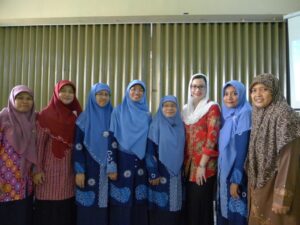
Claire-Marie Hefner is an Assistant Professor in Cultural Anthropology at Manhattanville College in Purchase, New York. In 2011, while a doctoral student at Emory University, she received a Dissertation Fieldwork Grant to aid research on “Shaping Muslim Subjectivities: Gender, Piety, and Modernity in Indonesian Islamic Boarding Schools,”supervised by Dr. Michael Gates Peletz. In 2016 Dr. Hefner received an Engaged Anthropology Grant to aid engaged activities on “Women, Piety, and Achievement: Dissemination of Research Findings in Indonesian Islamic Boarding Schools for Girls”.
Monday June 13th, 2016. It’s four-thirty in the afternoon and the pre-rain heat hangs heavy in the tropical air. Thirty university students sit in gender-segregated groups on the carpeted floors of the prayer hall at Pesantren Krapyak Ali Maksum, an Islamic boarding school in Yogyakarta, Indonesia. The women wear colorful floor-length skirts, long-sleeve tunics, and headscarves while the men don long pants or sarongs, long-sleeve shirts, and prayer caps. The students—all alumni of Krapyak—chat amongst themselves as they wait for the rest of their peers to trickle in. It’s the fasting month of Ramadan and in these final hours before sundown, students look tired. I circulate the room, stopping to catch up with several young women with whom I became friends during my research and now serve as dorm supervisors at their alma mater while they attend university nearby. Soon I begin my presentation in Indonesian, explaining my research findings on women’s achievement, moral education, and piety at Krapyak and a neighboring school. Afterwards, as a rain shower begins to cool the air, students ask questions like, “How did your time at Krapyak influence you view of Islam?” “Since ethnographers spend so much time at the place of their research, how can they maintain objectivity?” “How do the success rates of our school compare to others?” “What can we do to make our students even more successful?” As our lively discussion draws to a close, we pose for pictures together until the call to prayer sounds out from the school mosque signaling that it is time for our shared iftar meal.
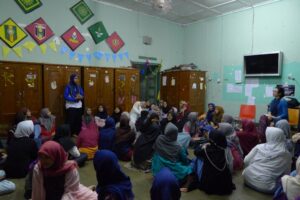
Caricatures of Islamic boarding schools as places of rote memorization, curricular inertia, radicalization, and limited human flourishing overlook the diverse and proactive ways in which Muslim schools mediate modern aspirations, gender practices, and citizenship, and play a critical role in molding educated, pious, and thoroughly modern youth. My dissertation, Achieving Islam: Women, Piety, and Moral Education in Indonesian Muslim Boarding Schools, explores the topic of ethical learning, subject formation, and new forms of women’s achievement at two nationally prominent Islamic boarding schools for girls in the city of Yogyakarta, Indonesia. The first school, Madrasah Mu’allimaat Muhammadiyah, is under the direct guidance of the “modernist” Muslim social welfare organization, Muhammadiyah. As a cadre school (sekolah kadre), school faculty and administrators aim to shape the future female leadership of the organization. The second school of my study, Pesantren Krapyak Ali Maksum, is among the most respected traditionalist Islamic boarding schools (pesantren) in Indonesia and it is a prime example of a pesantren that has adapted to meet the demands of modern Indonesian students and their parents, incorporating the national curriculum into its largely Islamic curriculum in the late 1980s. Both schools run six-year programs from middle school to high school. Based on twenty-one months of fieldwork, my research findings provide a snapshot of young prominent women members and potential future leaders in these organizations; a reflection on how these organizations have changed and the directions they have yet to go in.
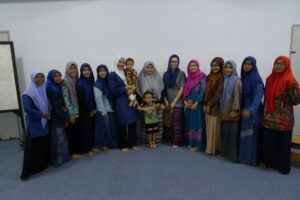
The Wenner-Gren Engaged Anthropology Grant generously supported a one-month visit to Indonesia in the summer of 2016 during which time I was involved in three main activities. First, I presented and discussed my research findings and analysis with educators, administrators, alumni, and students at the schools of my study. Achieving Islam builds off of eight years of collaboration and friendship with members of these communities and, in the interest of open dialogue and possible further collaboration, I was eager for feedback from my interlocutors. Second, I ran workshops with current students on social science research and what it means to be an anthropologist. Thirdly, this visit was an integral opportunity to cultivate and develop new connections with the local academic community and to develop possible future collaboration in the form of research and Indonesian-language publications.
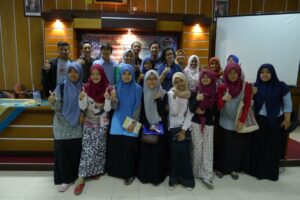
As premiere educational facilities invested in producing achievement-oriented young women, the school administrators and teachers at both Mu’allimaat and Krapyak expressed strong interest in my findings. My engaged anthropology project was an opportunity to have discussions with and presentations for administrators and teachers at each respective school. At these meetings, the findings of greatest interest were the results of my extensive student survey conducted on their campuses in 2011-2013. This survey addressed students’ socio-economic and familial backgrounds, their attitudes towards their experiences at school, their dreams for future careers and family, as well as their reported interest in continuing their involvement in NU and Muhammadiyah as compared to their parents’ generation. This latter point was of particular interest at Madrasah Mu’allimaat where most teachers and administrators are activists in the parent organization, Muhammadiyah, and very much invested in inspiring student involvement in the organization. These events were an opportunity for dialogue and debate with members of the school community during our lengthy discussions following my presentation. This dialogue centered around what my findings illustrate with regard the overall success of the schools’ respective curricula, a concern for how their school compared to others, as well as discussion of new programs administrators had been pursuing since the time of my research.
This engaged anthropology project also involved creating opportunities for discussion about my findings with former and current students at both schools. To do so, I carried out formal presentations and organized semi-formal discussion groups with recent alumni from each respective school like the one described above. I also ran activities and exercises with current students. For example, on May 27, 2016, ninety-five first-year high school students at Madrasah Mu’allimaat participated in a workshop that addressed the uses of qualitative and quantitative research methods, using the example of my own time at their institution (see Figure 2). In most Indonesian schools, the social science high school track is often considered second-tier compared to natural sciences, so my workshops were also an important opportunity to discuss the value and importance of the social sciences and humanities.
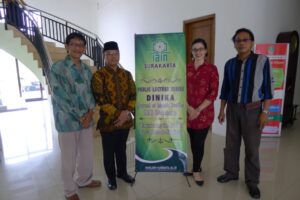
During this summer visit, I also had the pleasure of discussing women’s achievement and moral learning with some of the leading scholars of Islamic education and youth studies in Yogyakarta, Jakarta, and Surakarta. I presented my findings at three local universities in academic forums that were open to the public. At the Universitas Islam Negeri Sunan Kali Jaga (State Islamic University) in Yogyakarta, I presented my work for an audience of ninety Islamic education (tarbiyah) students. These students—almost all alumni from Islamic schools—are planning to go on to teach in Islamic educational institutions; as such, our discussion centered around contemporary developments in the Indonesian Islamic educational field. This presentation was documented in an article in Suara Muhammadiyah (Voice of Muhammadiyah), the national journal of the Muslim social welfare organization of the same name. I also reconnected with colleagues at the Center for Cross-Cultural and Religious Studies (CRCS) at Universitas Gadjah Mada in Yogyakarta—the research center that had been my sponsoring affiliate during my fieldwork.
With the generosity of Wenner-Gren Foundation, my summer engaged anthropology project was a resounding success. I look forward to developing the personal, academic, and professional relationships it helped to foster and maintain.